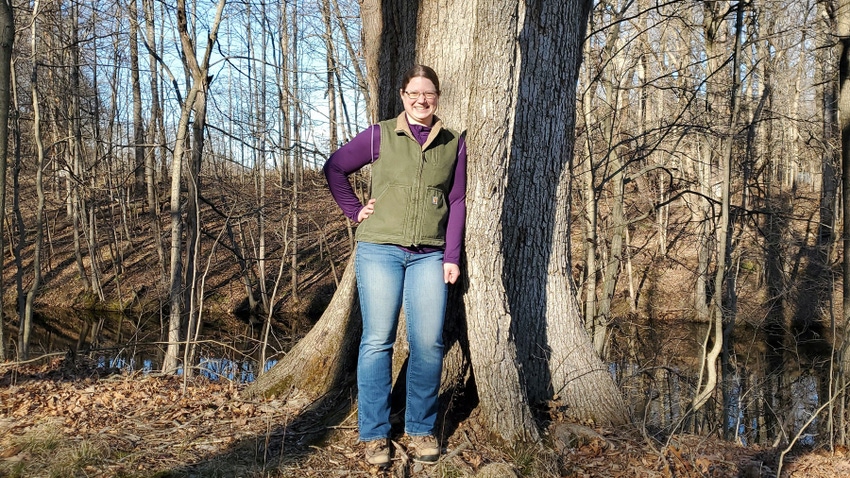
You likely visit your local soil and water conservation district office when you need help on a conservation project. Sometimes local leaders ask for assistance from state conservation personnel.
That’s where Amanda Kautz fits into the conservation picture. You may recognize Kautz by name. She contributes articles regularly to the Salute Soil Health series in Indiana Prairie Farmer. Kautz has served as a district conservationist in Indiana. Now she is assuming a statewide role as the state soil health specialist for the Natural Resources Conservation Service.
Meanwhile, Cara Bergschneider steps into a new role focusing on urban agriculture as NRCS state urban conservationist. She will assist those practicing intense agriculture, growing food on very limited space. Protecting limited resources is becoming even more critical, and that will be her mission.
Learn more about each of these women below, as they share more about their backgrounds and goals:
Who needs a soil health specialist?
by Amanda Kautz
I began as the NRCS state soil health specialist in Indiana on Jan. 30.
In my new role, I help provide technical assistance and training to our Indiana Conservation Partnership staff, as well as to customers and the public.
I’ll do this mainly through speaking about various soil health topics and performing soil health demonstrations at field days, trainings and events. I will also accompany staff and partners on farm visits. I’ll also assist with writing and updating technical guidance for soil health practices, such as no-till and cover crops.
My goal is always to support building soil health while setting attainable goals and keeping the system manageable for the farmer. I hope to assist those just starting on their soil health journey and others who have been in a soil health system for years.
I grew up in west-central Indiana, where my family owned and ran a sawmill. My parents encouraged my love of nature, leading me to pursue a degree in natural resources and environmental science at Purdue University. During my sophomore year, I took my first soils class. Immediately, I knew I wanted to focus on a career in soils and agriculture. In 2009, I started with NRCS as an intern. I’ve spent the past 10 years as a district conservationist, working in both northeast and southwest Indiana.
Soil health is something I am passionate about. I look forward to learning from all our farmers, agriculture professionals and Indiana Conservation Partnership staff, and hope I can teach them something as well. Indiana is considered a leader in soil health. I am excited to play a role in furthering Indiana’s soil health journey.
What does an urban soil health specialist do?
by Cara Bergschneider
I am the state urban conservationist for NRCS. This is a new position created to help advance conservation assistance to small-scale, specialty crop and urban farmers in Indiana. NRCS recognizes that conserving natural resources on these farms is just as important as on larger farms. Conservation practices that NRCS and partners have helped larger farms implement are now being adapted to fit small-scale production.
I have been with NRCS for about 13 years. Most recently, I was district conservationist in the Bloomington Field Office serving Monroe and Brown counties. There, I worked with more than 50 specialty crop producers and shared information on how to improve conservation, particularly soil health. Prior to that, I worked in southern Illinois as a soil conservationist and in upstate New York as a soil scientist for NRCS.
Growing my own food has been a lifelong passion. Some of my earliest memories are from time spent in the garden. My husband, in-laws and I had an organic specialty crop farm in southern Illinois for six years. During this time, we learned how to scale-up soil health and conservation practices while still having a productive and profitable farm. My husband and I now have large no-till gardens where we produce our own food and barter with other growers.
One of my main goals this year is visiting small-scale, specialty crop and urban farmers across Indiana, and the conservation professionals who work with them. What is working well? Where are they experiencing challenges? Are there conservation practices that could help overcome these challenges?
Providing information and training to NRCS employees and partners who interact with small-scale producers is a priority. I believe Indiana can become a leader in providing high-quality, relevant information on improving soil health and resiliency, water quality, wildlife habitat, and production to small-scale farmers. If you are interested in a visit or learning more about what resources are available, email [email protected] or call 812-369-3014.
Both Kautz and Bergschneider write on behalf of the Indiana Conservation Partnership.
Read more about:
Soil HealthAbout the Author(s)
You May Also Like




